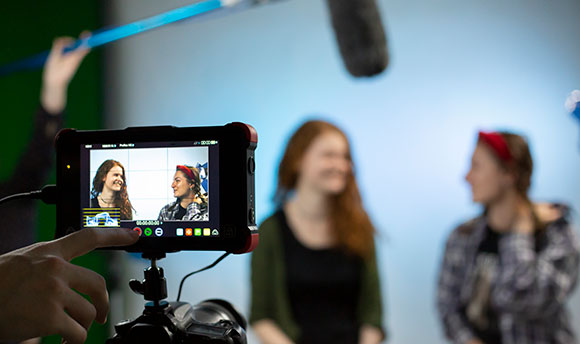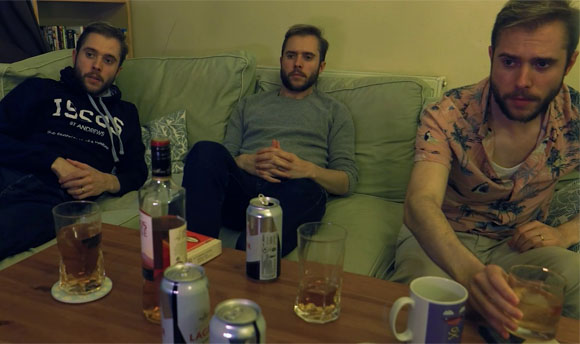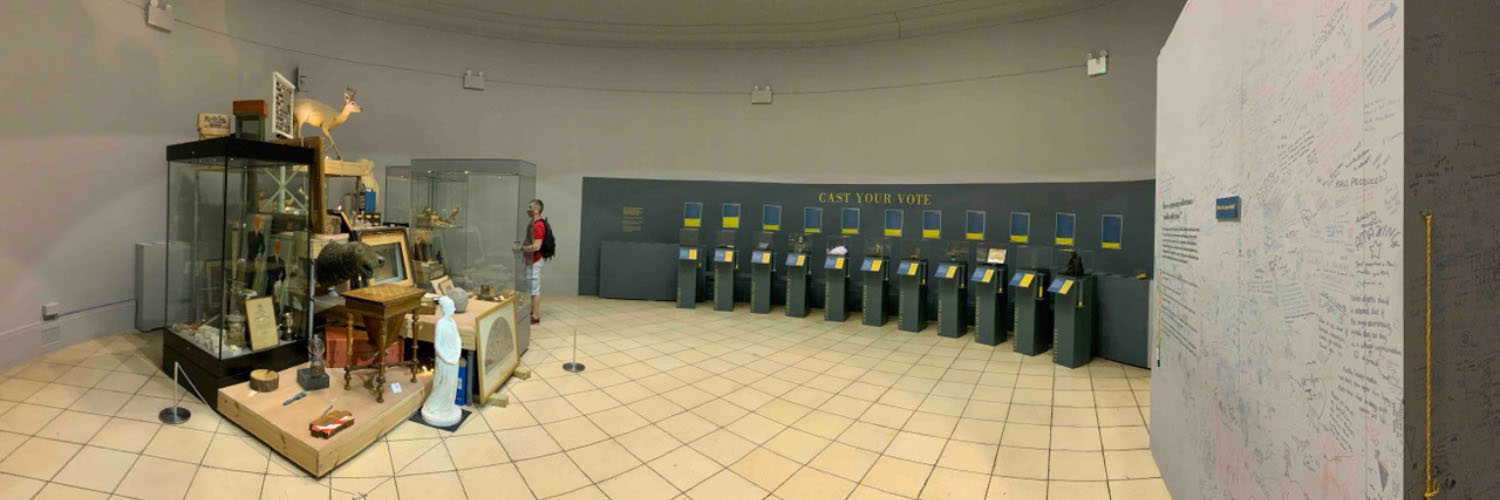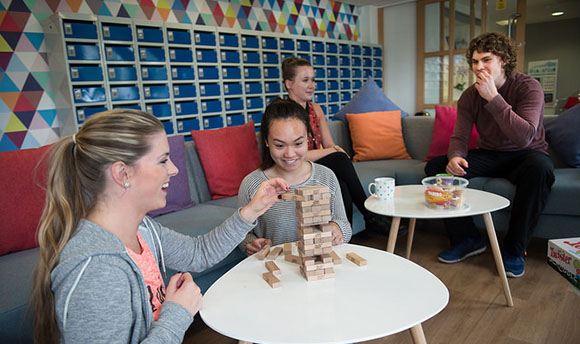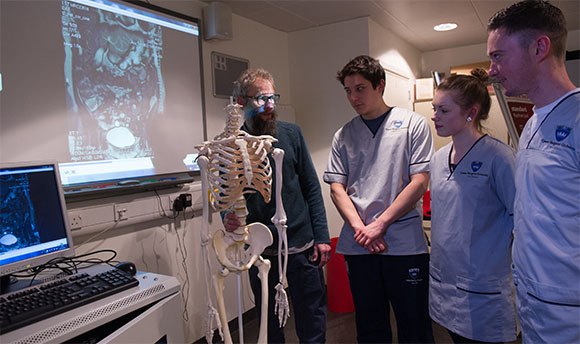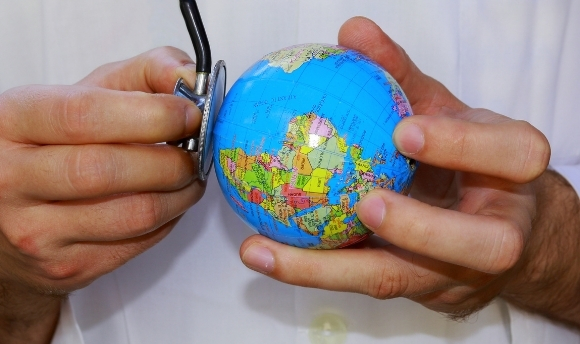Film and Media student Jack Parkhouse shares his experience as a gay student, of coming out and finding himself at Queen Margaret University, Edinburgh - from navigating the daunting first days of being a Fresher in a new environment, to finding a supportive LGBTQ+ community.
Starting university is scary for everybody. It’s an enormous change, treading anxiously into that brand-new world: the land of Domino's discounts and partying with strangers. And education, of course. It’s joining a new community and grappling with all that entails, ranging from meeting new people to, more importantly, finding the nearest snack machine.
It’s like moving schools, except everybody’s moving at the exact same time and nobody knows what’s going on. Directions to the Union please. What the heck is an “Eduroam”? Crikey, those swans are enormous. They look hungry. Where are the therapets? I’m scared. Yet starting university represents a new beginning, too. The opportunity to learn about yourself, to uncover who you truly are. It can be a journey of self-discovery, wandering into that uncharted land beyond Musselburgh train station. A soul-searching introspection amidst the honking of geese and smell of Maggies’ curly fries. It isn’t difficult to imagine how this combination of uncertainty and opportunity for self-discovery can have positive and negative effects on marginalised students. As somebody who is gay, I can testify to that. While daunting, starting at QMU empowered me beyond measure and has only bolstered my self-confidence throughout the years I’ve been here.
Let’s begin with a bit of an origin story: The prospect of ‘being gay’ was always something hazy to me growing up. It wasn’t because I was surrounded by homophobia or anything like that thankfully, but it simply wasn’t something I really knowingly encountered until I was about 18. I knew of it, of course—the debates about legalising same-sex marriage and adoption, etc.—but those were the sum of it.
From my perspective, gay people were an elusive entity, an ‘issue’ to be debated in class or used as an immature insult on the playground. Not real people. Not a phenomenon I ever knowingly encountered. So, the anxiety I experienced when I realised I might be gay had less to do with being afraid of homophobia (although that was certainly there), but simply not knowing, as silly as it sounds, how being gay worked. Could I get married? Could I have kids? Could I even be happy? My sexuality was something I reluctantly accepted. Fine, I’m gay I guess. Maybe they’ll eventually legalise same-sex marriage. Whatever. I’ll deal with that later. I hadn’t seen a lot of gay people on TV or roaming about in the wild, so I had no experiences to relate to.
This is why starting at QMU was invigorating. For the first time in my life, there were multiple, visible gay people. There they were, strolling about discussing Drag Race, wearing rainbow shoelaces and even holding hands. And most invigorating of all, these things were accepted. A kid in a candy shop would be an understatement.
Simply seeing other gay people on campus, and in fact, all facets of the LGBTQA+ community, normalised this part of who I was. Gay people were no longer hazy, or indistinct, or an ‘issue’—they were real people, which meant I must be a real person, too. This visibility and normalisation contributed the most to my increase in confidence throughout my time here. It wasn’t easy or immediate, of course, and before university I experienced a considerable amount of anxiety. You see, gay people often possess a heightened sense of self-preservation, an extra smidgen of adrenaline, armed and at the ready.
It’s a defence mechanism against bigotry, instinctively primed and nurtured by years of witnessing and experiencing homophobia. It’s a bit of a superpower: A Terminator-style scanner. ANALYSIS: HAS NICE SHOES. DIDN’T FROWN AT YOU. PROBABLY NOT A HOMOPHOBE. It’s absurd and often irrational, but perhaps understandable considering anyone on the street could hypothetically hate our entire existence. It’s something we haul around everywhere, often accompanied by a big red button inside our heads inscribed with the words ‘worst-case scenario.’ It’s an alarm blaring out and telling us to panic; Instagram is down, CC Blooms is closed, the swans are on the prowl and to top it all off there’s a homophobe somewhere in the bushes.
Naturally, as a very anxious gay person, on the night before term began, I slammed my fist on that button hard for no discernible reason. I just had a wobble, worrying about all the things mentioned above: will I fit in? Will people like me? Where are the snack machines?
Yet as alluded to above, my fears were unfounded. Nobody fit in at first, and people found one-another nonetheless. Sometimes at the Freshers Fair, sometimes in class, sometimes drunkenly at 2am when you somehow ended up in their kitchen eating humous straight out of the tub (don’t ask). People were just kind, and open-minded and diverse, because university is usually, but unfortunately not always, a more diverse environment than school. Like the proudly visible gay people I saw in my first week, it’s always easier to see yourself in the faces and experiences of those around you.
You can have community, solidarity and a sense of belonging. This is something that’s only improved across the years. The size of the LGBTQA+ community on campus has seemingly quadrupled; attendance to our society has increased; a rainbow flag is raised on campus yearly in honour of LGBT History Month, and the community generally has a much more prominent, and accepted, presence on campus. In terms of my personal progression, I remember hearing about the LGBTQA+ society during Freshers three years ago and apprehensively checking it out. Naturally, I then immediately ran away and avoided its committee for two and a half months because I was so anxious about being openly gay. Yet here I am today attending it weekly.
QMU gave me a sense of visibility and community, the privilege of walking around campus and seeing people just like me. It helped me embrace who I was, by everybody around me enthusiastically doing it first and dragging me headfirst into appreciating my worth and loving myself. I’d never been to Pride before my first year here, yet I’ve attended about seven since then, something that should be impossible considering it only happens yearly. I can only speak for myself here, but QMU became a place where I felt safe enough, and gradually confident enough, to be who I truly was. Not begrudgingly or reluctantly or because well, there’s nothing I can do about it, but because, as I discovered, I really am proud of and happy about being gay. QMU served as the perfect environment to facilitate this growth.
And yes, I found the snack machines. They had Maltesers, and I nearly cried tears of joy.
Unfortunately, we don’t all have positive experiences and especially during the current pandemic, it can be harder to avoid discrimination and keep our mental health in tiptop shape.
If you’re a member of the LGBTQA+ community and require a bit of help dealing with discrimination, hate crime, domestic or sexual violence, poor mental health or any issue that may require a shoulder to lean on, do not hesitate to check out the following hotlines and websites:
- National LGBT+ Domestic Abuse Helpline: 0800 999 5258 / help@galop.org.uk
- The Trevor Project
- LGBT Youth Scotland
- LGBT Health & Wellbeing: 0300 123 2523
- QMU Help Zone
- QMU Wellbeing Service
- QMU Counselling Service


